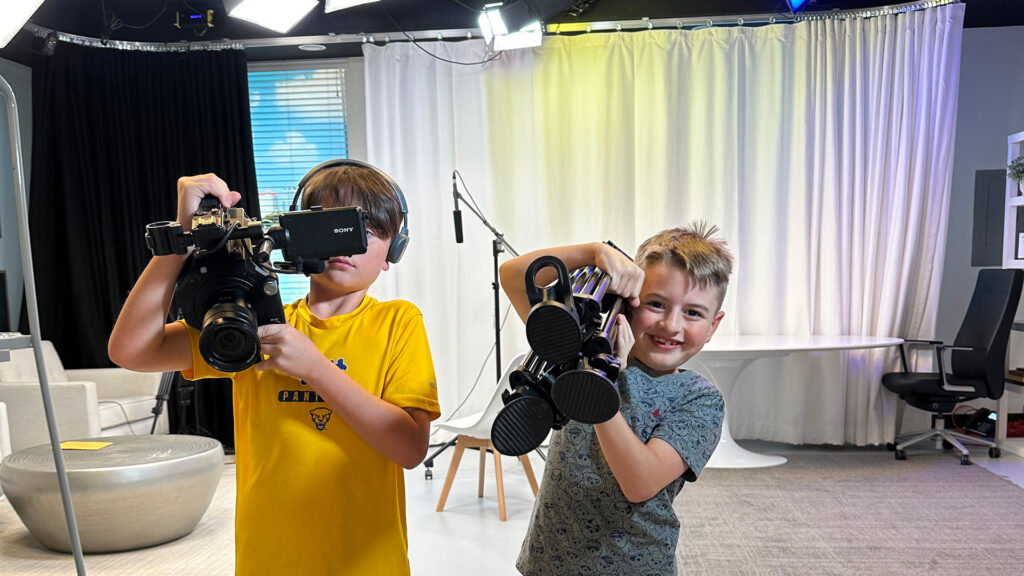Why Media Literacy is Crucial for Children Today
In today's fast-paced digital world, the landscape of media and communication is continuously evolving. Children are now born into an age where information is at their fingertips, and digital interactions are as natural as face-to-face ones.
From the youngest age, children are exposed to a vast array of media forms: social networks, digital advertisements, streaming video content, podcasts, and interactive games. This constant stream of media brings with it an immense impact on their cognitive, social, and emotional development.
As parents and educators, it's crucial to understand not just the surface-level effects of screen time, but the deeper influence that media content and consumption have on children’s understanding of the world. This is where media literacy comes into play.

The Current Media Landscape and Its Impact on Children
The current media landscape is characterized by its high accessibility, omnipresence, and incredibly rapid dissemination of information. Children are exposed to various media types that range from informative and educational to entertaining and sometimes misleading. The impact of this exposure includes:
- Increased Knowledge and Awareness: On one positive side, media can provide children with access to valuable information, broadening their understanding of the world.
- Development of Perceptual Skills: Interactive media, especially games and educational programs, can help develop certain cognitive skills including problem-solving, decision-making, and perceptual abilities.
- Risk of Misinformation: However, without the right skills to analyze and evaluate information, children can easily absorb misinformation and develop misconceptions about reality.
- Influence on Behavior and Attitudes: Media exposure also significantly affects children’s behavior and social norms; what they see in the media can influence their attitudes towards society, self-image, and relationships.
- Attention and Concentration Challenges: The fast-paced nature of digital media can contribute to shorter attention spans and a need for constant stimulation.
What is Media Literacy?
Media literacy is the ability to access, analyze, evaluate, create, and act using all forms of communication. In simpler terms, it’s about helping our children become critical thinkers and makers, effective communicators, and active citizens of the digital world. Media literacy isn’t just about understanding media but also about using it responsibly and effectively.
Why Media Literacy Is Becoming a Critical Skill for Today's Youth
In a world where media is all-encompassing, the ability to critically understand and interact with media is more than a skill—it’s a necessary competency for navigating today’s international culture. Here’s why media literacy is becoming indispensable:
- Critical Analysis: It empowers children to critically evaluate the content they consume, distinguishing between what is real and what is fake.
- Empowerment Through Creation: It enables them to produce their own content responsibly, understanding the ethical and social implications of media production.
- Enhanced Decision-Making: By understanding the media's influence, children can make more informed decisions in their daily lives and future.
- Social and Cultural Awareness: Media literacy helps children understand and respect cultural differences, fostering global awareness and empathy.
What Can We Do?
Armed with an understanding of the media landscape and the definition of media literacy, let's explore the tangible benefits of nurturing these skills in children. From enhancing their creative expression to empowering them to be informed citizens, media literacy opens up a world of positive opportunities.
The LGW Mediaworks Video Production Camp is a perfect example of how we can turn these challenges into opportunities for our children to grow, learn, and thrive in the media-rich world they inhabit.
The Importance of Media Literacy
Media literacy is more than just an educational goal; it's an essential toolkit for the digital age that empowers children to navigate the myriad challenges of the digital world. By fostering a nuanced understanding of media, we equip our children with the skills to interact with technology and media content thoughtfully and safely.

Navigating the Digital World
In the digital age, children are not just passive consumers of media; they are active participants. Media literacy teaches them to navigate this digital world with critical awareness and a discerning eye.
Safe Online Interactions
Media literacy helps children understand the landscape of the digital world, including distinguishing between secure and risky online environments. It teaches them to recognize phishing, scams, and other digital threats, ensuring they interact online safely.
Discerning Reliable from Unreliable Sources
With the overwhelming flow of information online, one of the most critical skills is discerning reliable news and information from misinformation. Media literacy equips children with the tools to evaluate the credibility of sources by checking for evidence, looking for trusted endorsements, and comparing information across different sites.
Responsible Social Media Use
Social media can be a minefield for the unwary, and media literacy helps children understand the impact of their digital footprint. It teaches them to:
Engage in positive, respectful online communication.
- Understand privacy settings and the importance of protecting personal information.
- Recognize and resist the urge to follow or share sensational but potentially false narratives.
- Reflect before sharing: understanding that what they share contributes to their digital identity and can have broader consequences.
Critical Thinking Skills
Critical thinking is at the heart of media literacy. It's the skill that enables children to not just consume media, but to analyze and question the content they encounter.
Analyzing Media Messages
Media literacy fosters an ability to see beyond the surface, asking questions about the media they consume:
- Who created this message, and why?
- What is the purpose of this message?
- How does it try to influence the viewer?What techniques are used to attract and hold attention?
- What lifestyles, values, and points of view are represented or omitted?
By engaging with these questions, children learn to read between the lines and understand the underlying messages and motives.
Recognizing Bias and Propaganda
Media literacy helps children identify bias in media, teaching them to recognize how and why certain information might be presented in a slanted manner. This is crucial for developing informed citizens who can engage with diverse perspectives and understand the broader context of the information they receive.
For instance, when a news story only presents one side of an argument, media literacy helps children recognize this lack of balance and question what isn’t being said. For instance, if a story about environmental policy doesn't include any input from scientists or environmental groups, a media-literate child would identify this gap.
Children learn to spot propaganda by analyzing the emotional appeals used and questioning the intent behind them. For example, if a campaign ad uses fear to persuade viewers, children can discuss what the ad is trying to achieve and whether the arguments it presents are based on facts or simply designed to manipulate emotions.
By teaching children media literacy, we're not just improving their academic skills; we're preparing them to be thoughtful, informed, and responsible participants in a digital world that's constantly changing. This foundation not only enhances their day-to-day decision-making but also sets the stage for lifelong learning and citizenship.
Benefits of Media Literacy for Children
Media literacy is a powerful tool that extends far beyond simply helping children understand what they see and hear in the media. By developing these skills, children gain numerous benefits that enhance their personal, academic, and eventually professional lives. Let's take a deeper look at these benefits.

Enhanced Communication Skills
Media literacy significantly improves communication skills, both verbal and written, by teaching children how to interpret and deliver information in various media forms effectively.
Improved Expression and Comprehension
By analyzing different media, children learn to understand and use language more effectively. They become adept at expressing their ideas and feelings, whether through writing their own stories, creating video content, or engaging in robust discussions.
For instance, after studying how journalists structure their reports, children might apply these techniques in their writing, making their school essays more clear and compelling.
Visual and Digital Communication
In a world where visual and digital communication is as important as textual, media literacy helps children to interpret and create messages in multiple formats. They learn the significance of images, videos, and digital design in storytelling and information sharing.
When children learn to create engaging presentations for school that combine text, images, and multimedia, it enhances their ability to communicate across different platforms. They are able to express themselves more effectively.
Creative Expression
Media literacy nurtures creativity by providing children with the skills to create their own media, not just consume it.
Empowerment Through Content Creation
Children are not just passive consumers of media; they become creators. This active participation encourages them to bring their ideas to life and share them with others, fostering a sense of accomplishment and creative confidence.
As an example, a child interested in wildlife can use video editing skills learned through media literacy to produce a short documentary on local wildlife, applying narrative skills and technical knowledge to communicate their passion.
Storytelling Skills
Understanding media forms helps children grasp the power of storytelling. They learn how to craft narratives that engage and inform audiences, using everything from language to visual elements to enhance their stories. By studying the way characters are developed for tv shows, children might be able to write more nuanced stories or create more complex characters in their own video projects.
Social Skills and Empathy
By teaching children to analyze and create media, media literacy also enhances their social skills and capacity for empathy.
Understanding Diverse Perspectives
Media literacy involves exploring different viewpoints and cultures through various media formats. This exposure helps children develop empathy and an understanding of global perspectives, reducing stereotypes and fostering inclusivity. For instance, through international films and news, children see life from different cultural lenses, helping them appreciate diversity and the universality of human emotions.
Collaboration and Teamwork
Many media projects require collaboration, whether in brainstorming ideas, filming, or editing. Media literacy encourages working collaboratively, which is crucial for developing teamwork skills. Working on a group project to create a short film can help children learn to negotiate, share ideas, and distribute tasks effectively, mirroring real-world collaboration.
Critical Awareness and Decision Making
Media literacy equips children with the critical thinking skills necessary to navigate the media they consume, fostering better decision-making in all aspects of their lives.
Enhanced Analytical Skills
By learning to question and analyze media, children develop strong analytical skills that apply to problem-solving in everyday situations. When children evaluate advertisements critically, they can make more informed decisions about consumer goods, recognizing persuasive tactics and making choices that align with their values.
Recognizing Influence and Making Informed Choices
Media literacy helps children understand how media influences their perceptions and decisions. This awareness helps them make more conscious choices about the media they engage with and the impact it has on their behavior. So by understanding the persuasive techniques used in video game marketing can help children decide what games are worth their time and which are not, based on their content and value rather than just effective advertising.
Preparing for the Future
The digital world is integral to almost every career path in the modern economy. Media literacy prepares children for the future by developing their adaptability and familiarity with various media tools.
Future Career Skills
As the digital landscape continues to evolve, media literacy ensures children are prepared for a variety of roles that require digital skills, from marketing and journalism to engineering and design. So a child who learns to analyze and create digital content could go on to excel in digital marketing, content creation, or even user experience design, fields that value the ability to communicate effectively across different media.
Informed Citizenship
In a democratic society, media literacy is essential for fostering informed and engaged citizens who can participate effectively in civic life. By understanding how media shapes public opinion, children can grow into adults who are better equipped to engage in political discourse, understand election campaigns, and make informed voting decisions.
By developing media literacy, children gain a richer, more nuanced understanding of the world and their place within it. They learn not only to consume media intelligently but also to produce content that reflects their values and perspectives. The skills they acquire extend into academic success, healthier social interactions, and eventually more informed and thoughtful participation in the wider world.
Our Video Production Camp is an excellent opportunity for children to develop these skills in a fun, supportive environment, turning learning into an adventure that they will carry with them for a lifetime.
Why Media Literacy Education is Essential
In an era marked by rapid technological advances and a never-ending stream of information, media literacy education has become not just beneficial but essential for the younger generation. This section explores why nurturing media literacy from a young age is crucial for personal development and future readiness.

The Influence of Media on Perception
Media is a powerful tool that shapes not only the information we receive but also our perceptions and beliefs about the world around us. For children, whose worldviews are still forming, the influence of media is particularly profound.
Shaping Worldviews
From a young age, children are exposed to various media that present different perspectives of the world. Through news, movies, books, and social media, they encounter a range of narratives and experiences. Media literacy helps them understand that these are representations, not necessarily reality, teaching them to seek out and consider multiple viewpoints. By comparing how different cultures are portrayed in various films and shows, children learn that media can often stereotype or omit nuances. Media literacy encourages them to research and learn more about these cultures beyond the screen.
Influence on Self-Image
Media significantly impacts children’s self-esteem and body image, often presenting idealized standards that are unrealistic. Media literacy education helps children understand the constructed nature of these images and promotes a healthier, more realistic self-image. When children understand that images in advertisements and social media are often edited or selected to promote certain views, they can better resist the pressure to conform to these unrealistic standards.
Understanding Different Cultures
Through media, children gain exposure to a variety of cultures and lifestyles, which can enhance their understanding and empathy. Media literacy helps them discern authentic representations from stereotypes and appreciate the diversity of the world. Media literacy enables children to understand that a documentary about another country might provide a more realistic view than a fictional movie set in that same place.
Expectations from Life
Media also shapes children's expectations of what their lives and futures could be like, influencing their aspirations and goals. Media literacy teaches them to identify when these expectations are shaped by the media and to form their own goals based on a broader range of information. Children influenced by the media might think every problem has a quick resolution, as often portrayed on TV. Media literacy helps them understand real-life complexities and fosters patience and perseverance.
Preparing for the Future
As we look to the future, the importance of media literacy only grows stronger, influencing career paths and the quality of civic engagement.
Importance in Various Career Paths
The need for media literacy extends far beyond the fields of journalism and entertainment. In virtually every career, media skills are increasingly vital due to the digital transformation affecting all sectors. As an example, in healthcare, professionals need to interpret and communicate complex information to patients and the public. Media literacy helps them create understandable content and discern which information should be shared through which channels. Again, in science and technology, professionals must not only keep up with the latest research but also combat misinformation by presenting their findings in clear, accessible ways.
Media-Savvy in Every Field
Being media-savvy is essential for success in nearly any field today. This includes being able to communicate effectively across various platforms, understand the media’s role within specific industries, and utilize digital tools to create and share content. A business leader uses media literacy skills to analyze market trends and consumer behavior, as well as to develop digital marketing strategies that resonate with diverse audiences. An educator uses media to enhance learning and engage students, from creating multimedia presentations to facilitating online discussions.
Informed Citizenship
Perhaps most crucially, media literacy is foundational for informed citizenship. It equips future voters to navigate the complex media environment, discerning fact from opinion and making decisions based on accurate information. Media literacy helps young people evaluate political advertisements and debates, understand election issues, and recognize bias in news reporting, enabling them to participate more fully in democratic processes.
The digital age has made media literacy an indispensable skill. By teaching children to question, analyze, and create media, we prepare them for a world where communication and information are omnipresent. Through media literacy, children grow into adults who can navigate the media landscape wisely, contribute to their communities, and pursue a wide range of careers with confidence and critical awareness.
The LGW Mediaworks Video Production Camp is designed to jump-start this vital education, providing hands-on experiences that translate into lifelong skills and understandings.
Introducing our Video Production Camp
In today's world, where media shapes so much of our daily life and culture, giving children the tools to understand and create media is more important than ever. Our Video Production Camp is a dynamic, hands-on program designed to immerse children in the world of media production and video editing, empowering them to become savvy creators and consumers of media.

Camp Overview
Our Video Production Camp is a week-long summer experience where children aged 7-12 learn the ins and outs of media production in an engaging, interactive environment. The camp is designed to spark imagination and creativity, turning passive media consumption into active media creation.
What the Camp Offers
Expert-Led Workshops: Learn from experienced journalists and media producers who bring real-world expertise into every lesson.
State-of-the-Art Equipment
Use professional-grade equipment to produce high-quality content, from cameras and microphones to editing software.
Collaborative Projects
Work in teams to create complete media projects that encourage teamwork and creative collaboration.
Camp Activities
Our camp is structured around a series of hands-on activities that guide children through every step of the media production process.
Scripting Stories
Campers will learn how to write compelling news stories and create scripts for various show formats. They'll understand narrative structure, journalistic integrity, and the art of storytelling.
Skills Enhanced - Writing, storytelling, critical thinking, and understanding of narrative structures.
Sourcing B-Roll
Participants will learn how to enhance their stories with appropriate b-roll footage, understanding how to match images with narrative to create a powerful visual impact.
Skills Enhanced - Research, visual literacy, and technical skills in video production.
Conducting Interviews
Campers will practice preparing and conducting interviews, learning to ask insightful questions and how to listen actively to capture the full story.
Skills Enhanced - Communication, active listening, and interpersonal skills.
Editing and Production
Bringing their projects together, campers will use editing software to combine footage, audio, and graphics to produce their final piece.
Skills Enhanced - Technical skills, creativity, problem-solving, and attention to detail.
Presenting and Feedback
At the end of the camp, students will present their projects. This session will include peer and instructor feedback, teaching them how to receive and use feedback constructively.
Skills Enhanced - Public speaking, self-reflection, and resilience.
Camp Enhances Media Literacy
Our Video Production Camp directly enhances media literacy by connecting the camp activities with the essential skills discussed in the article.
Enhanced Communication Skills
Through scripting stories and conducting interviews, campers improve their verbal and written communication. They learn to express ideas clearly and persuasively, adapting their message to different audiences and formats.
Creative Expression
Campers use their creativity in scripting, shooting, and editing their projects. This process helps them understand how media is constructed and allows them to express their ideas innovatively and authentically.
Social Skills and Empathy
By working in teams and conducting interviews, campers enhance their interpersonal skills and ability to understand others. These activities foster empathy, as they explore different perspectives and learn to tell stories that resonate with diverse audiences.
Critical Awareness and Decision Making
The entire process, from research to production, enhances campers’ ability to analyze and critique media. They learn to recognize bias, understand the audience, and make informed choices in their content creation
Preparation for the Future
The skills gained at our Video Production Camp are applicable in many future career paths. Campers leave with a strong foundation in media production and a deeper understanding of how media literacy can enhance their future academic and professional opportunities.
Help your child develop these essential media literacy skills in a fun, supportive, and educational environment. Consider enrolling them in our Video Production Camp this summer. They will leave camp with great memories and practical skills that will serve them for years to come.
Visit our Video Production Camp page. Find a session that works for your schedule. Go to the event page for the session that you would like to participate in. Find the "Tickets" section of the event page. Add the number of tickets that you would like to purchase. Click on the "buy" button and complete your transaction by filling in the information required about each of your campers. Then make your payment and get ready for a fun and exciting week learning about media production.
Don't miss this opportunity to invest in your child's future in the digital world.
Register for the Video Production Camp today and watch them transform from media consumer to media creator!
Sorry, we couldn't find any posts. Please try a different search.
